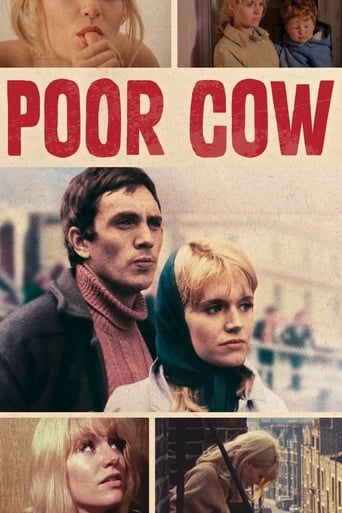Michael Daniels
If, like me, you grew up in London during the 60's then this film will strike a chord with you and what music it makes! Here we are not in the swinging 60's but the struggling 60's despite the promises of social justice. Here the focus on those left out of the prosperity and boom years of post war Britain. Terence Stamp, here at the beginning of his long and brilliant career, brings so much to his character and reminds us of the optimism and drive that was abundant in this decade even while serving out his prison sentence. At the forefront lie the attitudes, and bigotry of this decade and despite so called, "sexual freedom", attitudes to women remained entrenched in the past. Ken Loach manages to balance what essentially is the failings of the system against the never ceasing optimism of Joy (Carol White). It is clear that all she wants, , like everyone at this time, is a piece of the pie, yet somehow she never really seems to get it. Bad choices, bad decisions, and bad men, yet though all this hardship and sorrow, she says strong for her son, because in the end this is all she has. This is perhaps one of just a handful of films that brilliantly documents this decade.
Leofwine_draca
As mentioned elsewhere, I've been getting into the 'kitchen sink' dramas of Britain in the 1960s. Previously I've watched a handful of the early black and white ones, but POOR COW, the first film from long-time director Ken Loach, offered in a new wave of all-colour pictures that eventually heralded the way for the miserable likes of EASTENDERS and other soaps that came later. POOR COW is a product of its era and it shows, and that's what makes it interesting.The film is in essence the story of a young mother and her kid and their attempts to get by in a cruel and often harsh world. Carol White achieves level of naturalness in her performance that you don't often see, which means that she's utterly convincing. The male characters are presented as brutes, philanderers, or simply bland, cold men who don't care about the impact they make on people's lives. There's plenty of talent in the supporting cast, a lot of faces who would go on to become familiar on TV and in film, which makes this a fun watch despite the gruelling subject matter.The thing I found about POOR COW is that it kept me watching. I was always interested in finding out the outcome of the story, although any viewer will immediately realise that it's not going to be a happy ending. I was interested to note that the interlude in which White gets involved with a group of dodgy glamour photographers seemed to inspire a whole sub-genre of films directed by the likes of Norman J. Warren and Pete Walker. Apparently many of the scenes in the film were ad-libbed, which accounts for the slice-of-life realism of the piece.
jc-osms
You know what to expect when the first scene in Ken Loach's "Poor Cow" is a graphic image of Carol White's character giving birth to her son, although for my taste this was taking documentary realism to extremes. For the remainder of the film we follow White's progress, if that's the right word, for the next few years as she lives a mostly tawdry life on the edge of both poverty and legality, interacting with a mostly dubious set of individuals in not-so-swinging London in the mid-60's.The narrative is somewhat awkwardly interspersed with chapter plates, presumably written by White, although these don't actually aid the structure of the piece as the film progresses pretty much on a tangential basis although as an insight into her character's naive optimism and childlike simplicity, they may serve some purpose. Loach's soon to be trademark fly-on-the-wall camera-work is never still, long-shots, extreme close-ups, walking shots, tracking shots all to convince us like his acclaimed TV documentary "Cathy Come Home", of the previous year (with the same actress in the lead) of the veracity of his subject, stripping away all cinematic artifice. In this he succeeds, inviting no pity for her, only portraying her making do and working with what she has, with little prospect of escape.Of course this unremittingly bleak outlook can be overbearing and cold and there are many scenes where he could and should have called "Cut!" earlier, but as an insight into the working class of supposedly affluent Britain, it's important to hold up a mirror to society as he does here.In the final scenes, when White is reunited with her temporarily lost child, we are brought full-circle to that shocking opening scene as he reminds us that family love is perhaps the only true love. Whether it will be enough of a basis for White to break out and make a life for herself and her son is debatable so that some sort of a sequel might have been interesting to consider.The cast is an interesting with one with Terence Stamp demonstrating his range as the crook who White falls for and who shows her a kind of loving, even as the film makes clear in the only stagy scene in the film, his courtroom trial, that there are no victimless crimes. As in "Cathy Come Home", White holds the viewer's attention with her disarming honesty, vulnerability and spirit. Interesting to see the notorious John Pindin in a prominent role too.You don't watch a Loach film for comfortable viewing but as an agent-provocateur, turning over stones most would step over, he's an important director in British cinema.
cooked
Not a film of entertainment, but of real lives & limited ambition for the working class in 60's. Enjoyable because of my upbringing, not sure it'd work for most people. Typical Loach. Full of TV actors/actresses of 70's/80's/90's.
